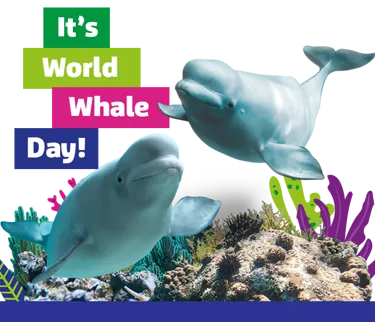Happy World Whale Day!
- Sunday 18th February 2024

World Whale Day first began in Maui, Hawaii in the 1980s. Initially, it began as a day to honour the humpback whales that swim near their coasts. Every year crowds of people flock to the island to take part in the event organised by the Pacific Whale Foundation. The celebration includes a parade with floats, fun characters, and children's activities!
However, World Whale Day has now become an important day dedicated to raising awareness about the actions we can take to help protect these majestic animals!
Did you know?
- Whales are divided into two main groups
The toothed whales and the baleen whales. The baleen whales do not have teeth, instead, they have a fibrous plate in their mouth that helps them consume big quantities of food including crustaceans and plankton. Toothed whales, on the other hand, have teeth that allow them to feed on larger animals including squid and fish.
- Whales live for a really long time
Bowhead whales can live for more than 200 years, whereas scientists have estimated that Killer whales live for more than 100 years.
- Whales use sound to communicate
Baleen whales communicate through the use of grunts, groans, and moans. On the other hand, toothed whales, use a series of unique whistles and clicks to communicate with one another.
- Beluga whales can swim backward
These incredible creatures are highly adaptable and can swim backward, similar to dolphins. They also have an advantage as their necks are not fused, therefore they can to move their heads in various directions.

Why do we need to protect whales?
When raising awareness of the plight of whales, education is vital! Whales are the largest animals on the planet but unfortunately, they are now listed as endangered due to climate change, pollution, overfishing, and whaling to name a few!
Whaling was widely practiced until as recently as 1986 - whales were hunted for oil, meat and blubber until the International Whaling Commission, placed a global ban on commercial whaling in 1986.
However, Iceland, Norway, and Japan continue to engage in the practice. It's estimated that whale populations have declined by up to 90 percent from pre-whaling numbers!
Whales play a significant role in helping to capture carbon from the atmosphere, this plays a huge role in the overall health of the marine environment and helps fight against climate change!

So, how can you help?
There's lots we can do to help make a difference and promote whale conservation!
- Reduce your usage of single-use plastic
Our oceans are full of a lot of pollution, threatening the lives of whales. Starting small when is the easiest option, reducing usage of things including plastic bottles, straws, toothbrushes or razors are a great place to start.
- Be mindful of the fish you consume
Certain certifications from organisations including the Marine Stewardship Council use more sustainable fishing methods which is helpful as our oceans are currently suffering from overfishing.
- Donate and support Marine Conservation organisations
Volunteering locally is a great place to start if this is an option. You can also help by donating directly to the cause, many organisations are making great efforts towards marine conservation including the SEA LIFE Trust.

HELP SUPPORT THE WHALES!
Our love for the ocean extends far and wide, since 2014, we’ve supported our global charity, the SEA LIFE Trust. They provide practical care for marine creatures through sanctuaries, and conservation projects campaigns to make a positive change to marine animals and wildlife globally.
The SEA LIFE Trust currently has two marine animal sanctuaries; our world-first Beluga Whale Sanctuary in Iceland and our Cornish Seal Sanctuary in the UK.
The SEA LIFE Trust Beluga Whale Sanctuary is the first of its kind in the world! The Sanctuary provides a new, more natural home in a sanctuary in the sea for previously captive beluga whales.
In celebration of today, we wanted to highlight our very own whales - Little Grey and Little White, residents of our Beluga Whale sanctuary. They made an epic journey of 6,000 miles all the way from China to their new natural home in a bay in Iceland!
Make a real splash by donating today and help the SEA LIFE Trust in their conservation efforts, provide care and rehabilitation for the first resident whales, and support protection for whales in the wild!
Find out more

Online from
£31
Per adult
On the day
£39
Per adult
- Entry at your chosen 15-minute time slot
- Discover species from around the world in 14 themed zones and interact with them at our public feeding, diving displays and touch pools
-
Book early & save!
Skip the Door Pricing: Tickets booked online in advance are consistently cheaper than purchasing on the day so that you can enjoy more for less.
Ticket Type Save up to 28% with Advance Booking On the day / Walk-up Adult
From £28 £39 Child (2 - 15 years)
From £25 £35 Under 2
Free Free Please note online ticket prices vary depending on available capacity and prices may fluctuate during periods of high demand.
Online from
£33
Per adult
On the day
£44
Per adult
- Enjoy the freedom to arrive at any time on the day of your choice - no rush, just adventure at your own pace!
Online from
£59
Per adult
Save up to
£29.99
when booked together
- Choose from London Eye, Madame Tussauds London, London Dungeon, Shrek's Adventure! London, River Cruise and Big Bus Tour London
- Visit your other attractions within 90 days of visiting SEA LIFE
- Reschedule for free if your plans change